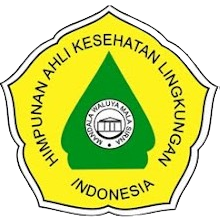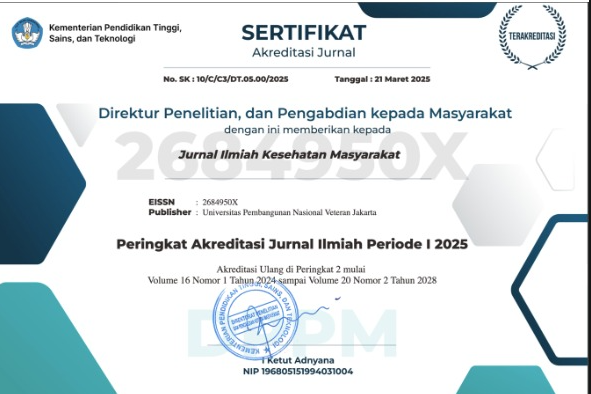Intervensi Obesitas Berbasis Keluarga
Abstract
Abstrak
Latar belakang: Obesitas merupakan salah satu masalah besar dalam bidang kesehatan. Pada tahun 2016, diperkirakan sekitar 41 juta jiwa anak yang berusia dibawah 5 tahun merupakan penderita berat badan lebih atau obesitas. Penelitian ini bertujuan untuk menguraikan beberapa intevensi obesitas berbasis keluarga berdasarkan beberapa penelitian yang sudah ada sebelumnya.
Metode: Penelitian ini merupakan penelitian dengan systematic review dengan menggunakan metode PRISMA. Sumber data penelitian berasal dari literatur yang diperoleh melalui internet dengan membuka situs web yaitu Science Direct, Proquest dan Google Scholar. Setelah memperhatikan kriteria inklusi dan eksklusi, digunakan 10 jurnal internasional sebagai acuan.
Hasil: Intervensi obesitas berbasis keluarga dapat dilakukan dengan berbagai macam cara, antara lain ialah dengan mengubah budaya makan yang kurang sehat, memperbaiki pola makan, melakukan aktifitas fisik, berperilaku sehat, memberikan motivasi untuk hidup sehat, segera melakukan pengobatan jika terjadi kasus obesitas dan memperhatikan social ekonomi dalam keluarga.
Kesimpulan: Berdasarkan hasil penelitian, diketahui intervensi yang paling efektif dan sering dilakukan adalah dengan mengubah budaya hidup yang tidak sehat terkait dengan pola makan dan aktifitas fisik dalam lingkungan keluarga.
Family Based Obesity Intervention
Abstract
Background: Obesity is one of the big problems in the health sector. In 2016, an estimated 41 million people under the age of 5 were overweight or obese. This research aims to elaborate a number of family-based obesity interventions based on several existing studies.
Method: This research is a systematic reviewed using the PRISMA method. The source of research data came from the literature obtained through the internet by opened websites namely Science Direct, Proquest and Google Scholar. After considering the inclusion and exclusion criteria, 10 international journals were used as a reference.
Results: Obesity interventions carried out by families in various ways, among others by changing unhealthy eating culture, improving eating patterns, doing physical activities, behaving healthily, providing motivation for healthy living, immediately taking medication in case of obesity. and pay attention to social economy in the family
Conclusion: Based on the results of the study, it is known that the most effective and frequent intervention is to change unhealthy living cultures related to diet and physical activity in the family environment.
References
Branscum P, Sharma M. After-school based obesity prevention interventions: A comprehensive review of the literature. Int J Environ Res Public Health. 2012;9(4):1438–57.
Gruber KJ, Haldeman LA. Using the family to combat childhood and adult obesity. Prev Chronic Dis [Internet]. 2009;6(3):A106. Available from: http://www.ncbi.nlm.nih.gov/pubmed/19 527578%0Ahttp://www.pubmedcentral.n ih.gov/articlerender.fcgi?artid=PMC2722 397
WHO. Obesity and overweight [Internet]. World Health Organization. 2018 [cited 2019 Mar 20]. Available from: https://www.who.int/news- room/fact-sheets/detail/obesity-and- overweight
Cheong WS. Overweight and obesity in hypertension. Gen Re. 2014;54(3– 4):205–12.
Carbert NS, Brussoni M, Geller J, Mâsse LC. Moderating effects of family environment on overweight/obese adolescents‘ dietary behaviours. Appetite [Internet]. 2019 Mar 1 [cited 2019 Mar 13];134:69–77. Available from: https://www.sciencedirect.com/science/ar ticle/pii/S0195666318302605
Al-Khudairy L, Loveman E, Jl C, Mead E, Re J, Fraser H, et al. Diet , physical activity and behavioural interventions for the treatment of overweight or obese adolescents aged 12 to 17 years. Cochrane Database Syst Rev. 2017;(6).
Barkin SL, Gesell SB, Po‘e EK, Tempesti T, Escarfuller J. Culturally Tailored, Family-Centered, Behavioral Obesity Intervention for Latino- American Preschool-aged Children. Pediatrics. 2012;130(3):445–56.
Espinoza J, Chen A, Orozco J, Deavenport-saman A, Yin L. E ff ect of personal activity trackers on weight loss in families enrolled in a comprehensive behavioral family-lifestyle intervention program in the federally quali fi ed health center setting : A randomized controlled trial. Contemp Clin Trials Commun [Internet]. 2017;7(December 2016):86–
Available from: https://doi.org/10.1016/j.conctc.2017.06. 004
Adams K, Alexandra DX, Tomayko J, Cronin A, Prince J. Predictors of Overweight and Obesity in American Indian Families With Young Children. J Nutr Educ Behav [Internet]. 2019;51(2):190–8. Available from: https://doi.org/10.1016/j.jneb.2018.07.01 1
Williams NA, Richey P a, Ph D, Hare M. NIH Public Access. 2012;31(9):705–12.









.jpg)








